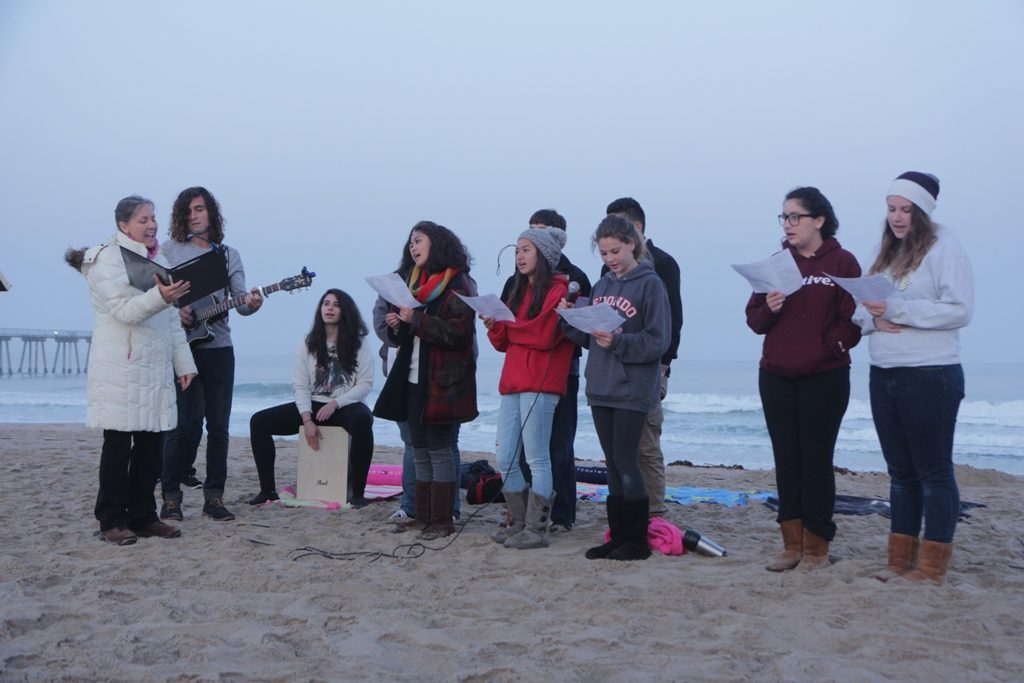by Garth Meyer
A change in county permitting for beach events has led to a threat of legal action to keep Church on the Beach in its spot every Sunday, as it has been for the past 15 years.
The matter arose last fall when Church on the Beach filed for new permits as an offshoot of King’s Harbor Church, which first began the Redondo Beach sand services in 2007.
Pastor Jason Fentye was informed that permitting rules had changed.
The Sunday worship previously had not been charged a fee.
The new policy limits it to six events per year, with two waived fees, and the four other Sundays charged at $250. In addition, the church service will not be allowed on Redondo Beach.
Church on the Beach has an advocate in the American Center for Law & Justice (ACLJ), which sent a letter March 6 to L.A. County Beaches & Harbors alleging religious discrimination.
“While the Department cannot comment specifically on threatened litigation, our permitting process is designed to ensure equitable beach access for everyone,” said Nicole Mooradian, Beaches & Harbors spokesperson. “We require permits for large gatherings, and generally prohibit ticketed events that block public access. Moreover, those who reserve space on public beaches for larger gatherings are required to pay permitting fees that help cover the cost of beach maintenance, including cleaning restrooms and removing trash after such events so that the general public may continue to enjoy the beach.”
What brought on the changes?
“It’s really equity, about not giving anyone special treatment,” Mooradian said, noting requests the department has received such as from WWE to set up a pro wrestling arena on the beach, another group wanting to hold a polo match in the sand, another a tech show in a parking lot, concerts, brand activations and private parties; all of which would restrict public access. “We’re just trying to keep the beach enjoyable for everyone.”
Mooradian also noted that activities such as summer camps and surf lessons reserve beach space in a competitive bid process to obtain a paid license.
The ACLJ’s letter claims a breach of constitutional rights by the new L.A. County policy which “singles out religious groups for discriminatory treatment in the rules about the use of public beaches.”
Church on the Beach draws more than a hundred people each week, on average. The outreach says they cater to people who have had negative or uncomfortable experiences in church buildings.
Church on the Beach appeals to people who may not otherwise set foot in a traditional church, they say.
The Department of Beaches and Harbors no longer issues yearly permits, and will now limit Church on the Beach to holding events at Dockweiller State Beach, Mother’s Beach and Will Rogers State Beach.
“I can’t comment on why those beaches were chosen,” Mooradian said.
As for now, L.A. County has issued a temporary permit to King’s Harbor Church for a six-month extension at Redondo Beach.
The ACLJ sent its letter to Beaches and Harbors on behalf of Church on the Beach, and co-pastors Ron Chan, Jason Flentye and Ritch Hansen.
The letter demands that “L.A. County immediately cease from discriminating against Church on the Beach for its religious activity, and instead immediately agree to allow the church to continue meeting pursuant to generally applicable L.A. County policy.”
Last July, Church on the Beach was created as a separate entity to King’s Harbor Church, becoming official in September, led by co-pastor Flentye.
The group assembles just down the slope from Miramar Park near the edge of Torrance Beach, from 8 am. to 11 a.m. each Sunday.
Church on the Beach does not obstruct traffic, the ACLJ contends, the Strand is unaffected and room is left in front and behind the group for others to pass by on the beach during services.
“Church on the Beach is committed to not causing any disruption in the community,” the letter reads.
It explains that once it was set up as an independent entity last fall, Pastor Flentye called the Dept. of Beaches and Harbors to start the permit process for 2025. He was told that in October the county began a new policy not to issue yearly permits.
“We’re currently in the process of revising our policy because of high demand from religious and other groups,” Mooradian said. “Think of it like surf contests. People would have surf contests every week if they could. Surf contests are restricted to specific beaches (that the county manages).”
In the South Bay, L.A. County manages Torrance Beach, Redondo Beach, Manhattan Beach, Dockweiller State Beach, and up north, Will Rogers State Beach – the latter two under an agreement with the state.
Hermosa Beach is managed by its city. Similarly, El Segundo Beach is not managed by the county.
Mooradian noted that the only events now that the department does not charge for permits are beach cleanups.
Efforts to reach a representative of Church on the Beach for this article by presstime were unsuccessful. ER










